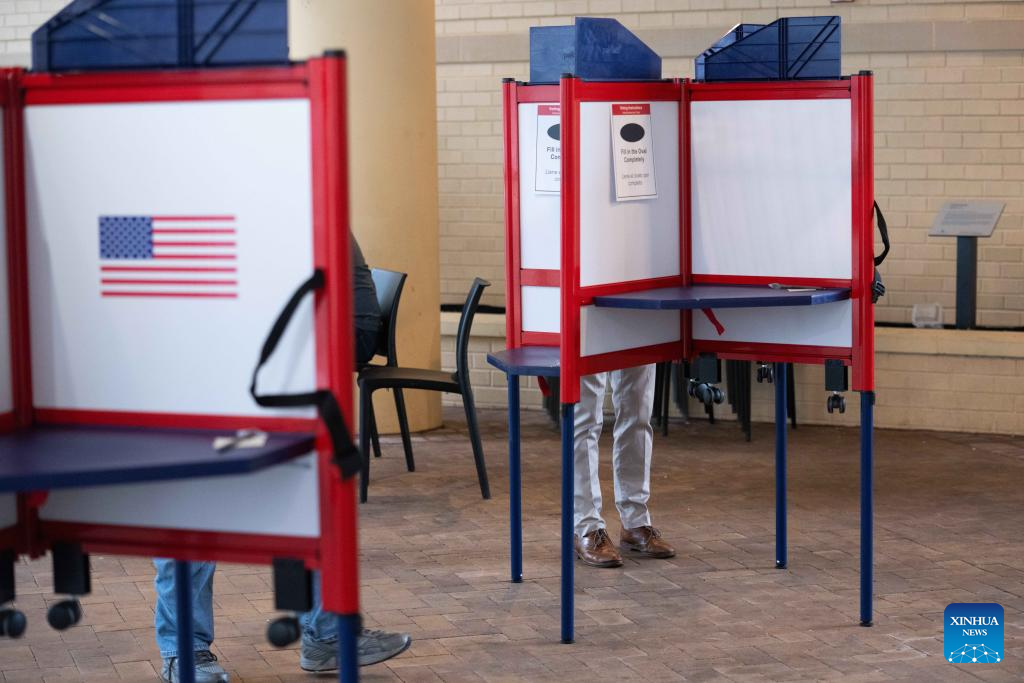
A polling station is seen during the 2024 presidential primaries in Arlington, Virginia, the United States, March 5, 2024. [Photo/Xinhua]
By Anthony Moretti
The first Tuesday in March is supposed to be a critical day in American politics. That is because voters in 15 states and one U.S. territory confirm their presidential choices with Republican voters selecting their preferred nominee, and Democrats doing the same.
However, in 2024, Super Tuesday had all the excitement of stale bread and flat soft drinks. And the absence of enthusiasm this year served as an important indicator of the trouble American democracy is in. At least four reasons explain why March 5 was just another day on the U.S. political calendar.
The first reason: The presidential candidates are already locked in. Granted, neither U.S. President Joe Biden nor former President Donald Trump has won a majority of their parties' delegates, but the reality is they will be the Democratic and Republican nominees unless a major health crisis or legal matter gets in the way.
Biden has been unable to address the persistence presence of Robert Kennedy, Jr., who seeks media attention and holds unconventional views. Meanwhile, the path for Trump finally smoothed out on Wednesday once former South Carolina governor Nikki Haley dropped out of the race after failing to win one Republican primary or caucus.
Therefore, the voters are well aware that Biden and Trump are their choices in 2024. Great, right? Hardly.
A second reason why Americans shrugged at this year's Super Tuesday: A significant number of Americans are not eager to see either man in the White House. A recent Reuters poll found that 18 percent – meaning almost one in every five potential voters – said they might not vote on November 5, which is Election Day, if faced with Biden and Trump as the major party candidates. One voter told Reuters: "I hate to think that we're constantly navigating the lesser of two evils."
Recent primary results in Michigan provided a glaring example of the absence of enthusiasm for the 81-year-old Biden. In Michigan, more than 13 percent of Democratic voters chose "uncommitted," an indication that Biden could be on shaky ground with union workers and the significant Arab-American populations in that state.
And while the 77-year-old Trump is the lone Republican candidate now that all his fellow Republican presidential rivals have given up, it was less than one year ago that 44 percent of Republicans reported in one poll that they did not want him running again.
Both men and their political teams know that if enough disaffected Democratic or Republican voters in the key battleground states (Arizona, Georgia, Nevada, Michigan, Pennsylvania and Wisconsin) opt not to go to the polls on November 5, their opponent might win the election. Likewise, if enough voters choose a third-party candidate, akin to a protest vote, then Biden or Trump could be in trouble.
Yes, America, we are "constantly navigating the lesser of two evils."

Voters fill in ballots during the 2024 presidential primaries at a polling station in Arlington, Virginia, the United States, March 5, 2024. [Photo/Xinhua]
A third reason why Super Tuesday was dismissed: The electorate knows that U.S. troops are not going to Ukraine or Gaza and engaging with the conflicts there. As a result, while there is ongoing debate within the Democratic and Republican parties about the policies the U.S. ought to pursue in order to advance the potential for peace in Ukraine and Gaza, the anger that was evident throughout America during the wars in Iraq and Afghanistan two decades ago is not present in the U.S. today.
Therefore, neither Biden nor Trump can run on a "make the world safe for democracy" or "bring the troops home" message in 2024. The legitimate humanitarian crisis in Gaza does draw news media headlines, but the guarantee of no U.S. troops going to either place blunts the visceral reactions seen 20 years ago.
The fourth reason to ignore Super Tuesday was the one that carried clear warning signs for the health of democracy in the U.S.: Too many Americans are disgusted with their political system (and as we have seen with their presidential choices). Here is the unvarnished truth reported in a recent Pew Research Center poll: "Majorities [of Americans] say the political process is dominated by special interests, flooded with campaign cash and mired in partisan warfare. Elected officials are widely viewed as self-serving and ineffective."
If that was not enough to open your eyes, then here is one more statement from Pew: "Just 4 percent of U.S. adults say the political system is working extremely or very well; another 23 percent say it is working somewhat well. About 63 percent express not too much or no confidence at all in the future of the U.S. political system."
Read that last sentence again. And carefully: More than six out of every 10 Americans believe the democratic system is broken and might be beyond repair.
Why is a disgruntled electorate dangerous for the country? The myth of American "exceptionalism" explodes. Claims from the highest levels of the political class that America is the model of democracy that the world must adopt are laughed at. Doubts about America's goals on the domestic and international stage grow.
There can be no Super Tuesday, or any other super day, in U.S. politics if the majority of the American populace has surrendered belief in the democratic system. Therefore, whether Biden or Trump wins in November, he had better pursue policies that instill confidence at home. The world will be watching.
Anthony Moretti, a special commentator for CGTN, is an associate professor at the Department of Communication and Organizational Leadership at Robert Morris University.

 中文
中文



